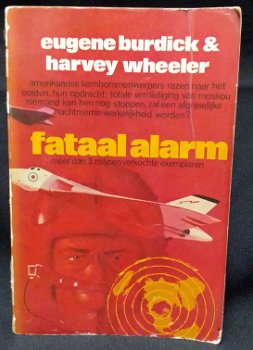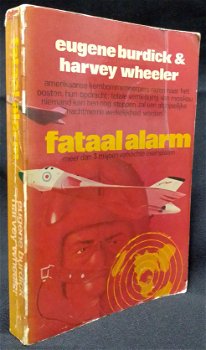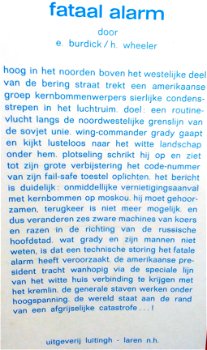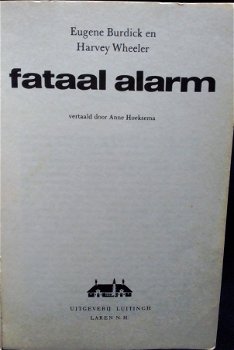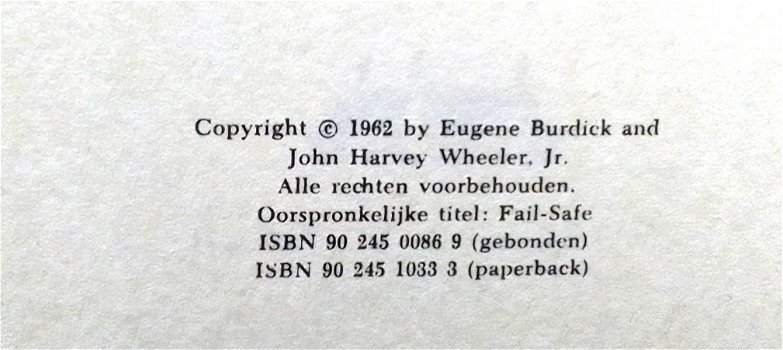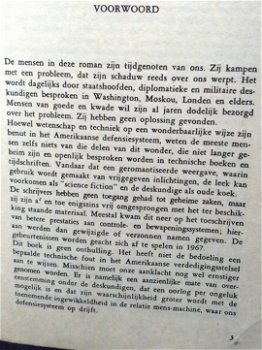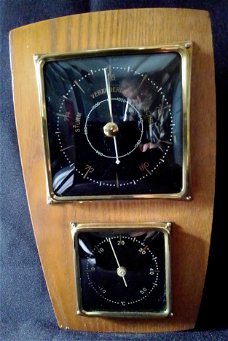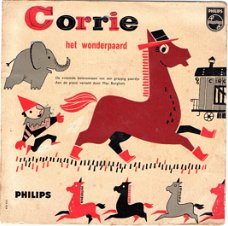
Fataal alarm(fail-safe),1962,atoomoorlog,Burdick/Wheeler,gst
Kenmerken
- Conditie
- Gebruikt
- Levering
- Ophalen of verzenden
Omschrijving
Fataal alarm.
Originele titel: Fail-Safe (een militair begrip dat er geen onveilge situatie door technische fouten kan ontstaan).
Een adembenemende en zeer spannende roman die zich afspeelt ten tijde van de koude oorlog.
De roman handelt over een technische fout in de beveiliging van het luchtruim waardoor Moskou en New York worden vernietigd door een atoombom.
Moskou wordt ten onrechte gebombardeerd. Om een totale wereldbrand te voorkomen besluit de Amerikaanse president de stad New York op te offeren. Na het bevel New York te vernietigen pleegt de president van Amerika zelfmoord.
Een thema dat nu weer aktueel is door de Oekraine crisis.
Auteurs: Eugene Burdick en Harvey Wheeler.
Het boek is in 1964 verfilmd door Sidney Lumet met beroemde acteurs zoals Henry Fonda en Walther Matthau.
Voor meer informatie wordt verwezen naar de bijgevoegde foto van de boekbeschrijving.
Uitgegeven door:Uitgeverij Luitingh Laren NH
Jaar van uitgifte: 1962
Aantal blz.: 210
In goede maar gelezen staat.
Afmetingen:
Dik: ca. 2.9 cm/ hoog: ca. 20 cm/ breed ca. 13.2 cm
Op verzoek worden verdere detailfoto's toegezonden.
Onderstaande samenvatting is afkomstig van een USA site:
"U.S. Air Force command center receives information that an unknown aircraft is approaching from Europe. The alert status of the Strategic Air Command's (SAC) bomber forces is raised, a standard precaution against a sneak attack. The unknown aircraft then disappears from radar, causing the alert status to continue to increase, eventually leading to the bombers being sent into the air to the fail-safe points. From there, they can proceed to their targets only if they receive a special attack code from the on-board "fail-safe box". After a short time, the unknown target is reacquired and identified as an off-course commercial airliner. The S.A.C. threat level is immediately reduced, and the bomber fleet is sent a recall order.
A technical failure at the height of the alert allows the attack code to be accidentally transmitted to Group Six, which consists of six Vindicator supersonic bombers. Colonel Grady, the head of the group, tries to contact S.A.C. Headquarters in Omaha, Nebraska to verify the fail-safe order (called Positive Check), but Soviet radio jamming prevents Grady from hearing them. Concluding that the fail-safe order and the radio jamming could mean only nuclear war, Grady orders Group Six crew toward Moscow.
At meetings in Omaha, at the Pentagon, and in the fallout shelter of the White House, American politicians and scholars debate the implications of the attack. Professor Groteschele, a civilian advisor, suggests that the United States follow this accidental attack with a full-scale attack to force the Soviets to surrender. The President of the United States (unnamed but apparently modeled on John F. Kennedy) refuses to consider such a course of action.
Instead, the President orders the Air Force to shoot down the bombers. Some officers at S.A.C. and in the pursuing fighter jets protest, stating that the fighters cannot easily catch the bombers and will run out of fuel over the Arctic Ocean in the attempt. The President orders them to try anyway, and the six "Skyscrapper" supersonic fighters (F-104 Starfighter-like aircraft) in the area engage their afterburners and, just prior to their fuel running out, fire their rockets in futile attempts to hit the bombers. The fighters fall into the sea, and the pilots are lost.
The President contacts the Premier of the Soviet Union, identified in the book as Nikita Khrushchev, and offers assistance in attacking the group. The Soviets decline at first; however, they soon decide to accept it. At S.A.C. headquarters, a fight breaks out over the very idea of working with the Soviets to shoot down their own aircraft. Air Force General Bogan attempts to stop the attack, but his executive officer, Colonel Cascio, wants it to continue. Cascio attempts to take over command of S.A.C., but is stopped by the Air Police. However, precious time has been wasted.
Meanwhile, the Soviet P.V.O. Strany air defense forces have managed to shoot down only two of the six planes. The Soviets accept American help and shoot down a third plane. Two bombers and a support plane remain on course to Moscow. Bogan tells Marshal Nevsky, the Soviet air defense commander, to ignore Plane #6 (the support plane) because it has no weapons. Nevsky, who mistrusts Bogan, instead orders his Soviet aircraft to attack all three planes. Plane 6's last feint guarantees that the two remaining bombers can successfully attack. Following the failure, Nevsky collapses.
As the two planes approach Moscow, Colonel Grady uses the radio to contact S.A.C. to inform them that they are about to drop their bombs. As a last-ditch effort, the Soviets fire a barrage of nuclear-tipped missiles to form a fireball in an attempt to knock the low-flying Vindicator out of the sky. The Vindicators shoot up one last decoy, which successfully leads the Soviet missiles high in the air. However, one missile explodes earlier than expected; the second bomber blows up, but Colonel Grady's plane survives. With the radio channel still open, the President attempts to persuade Grady that there is no war. Believing that such a late recall attempt must be a Soviet trick, as per his training, Grady ignores them.
The nearby explosion of the Soviet missiles has given the bomber crew a huge radiation dose, and Grady tells his crew, "We're not just walking wounded, we're walking dead men." He intends to fly the aircraft over Moscow and detonate the bombs in the plane. His co-pilot agrees, noting, "There's nothing to go home to" under the belief that the United States has already been devastated by a full-scale nuclear attack from the Soviet Union.
When it becomes apparent that one bomber will get through Soviet defenses and destroy Moscow with their two 20-megaton bombs, the American President states that he will order an American bomber to destroy New York City at the same time, using two 20-megaton bombs, targeting the Empire State Building as ground zero; this also involves a grave personal sacrifice, as the First Lady is visiting New York, and the President decides not to warn her. On hearing the New York attack plan, the supposedly atheist Communist leader bursts out with "Holy Mother of God!" He is appalled but realizes that it is the only way to prevent a worldwide nuclear war which will probably destroy humanity as "others" (presumably the Soviet military) would not accept the unilateral destruction of Moscow, and would depose him and retaliate against The West. Moscow is bombed and immediately thereafter the New York bombs are dropped by a senior general within S.A.C., a long-time friend of the president's who orders his crew to let him handle the entire bombing run by himself, assuming responsibility for the destruction of New York city; he then takes his own life."
